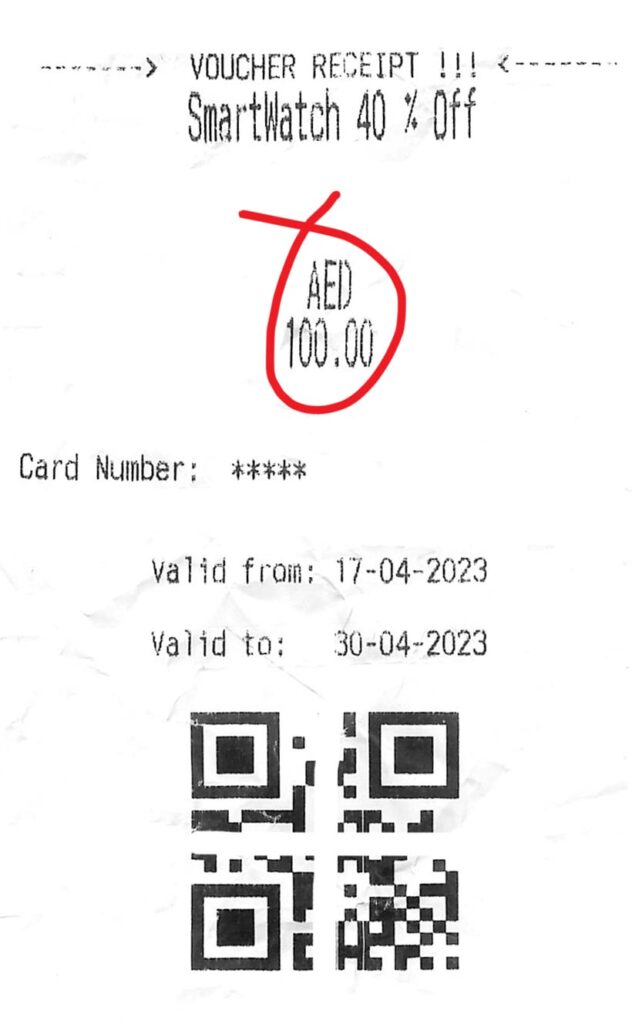The practice of showing discounts on products that are already priced at the discounted rate is known as “phantom discounts” or “fictitious pricing.” This practice is unethical and can mislead consumers into believing that they are getting a better deal than they actually are. This is particularly problematic when consumers make purchase decisions based on the perceived value of the discount. We all love a good deal, especially when shopping for our favorite products. But what happens when the discount we think we’re getting turns out to be a mere illusion?
For example, I received a coupon from a shop after purchasing a product. In the coupon it states that I will receive 100 dirhams off for a smart watch. At that moment I thought it was a good offer but later that day when I did some research on the product online in search of its actual price. This particular brand is not available in amazon or in any other famous e-commerce website. But different smart watch models with similar features are found available with average 50-75 dirhams. I continued my research and found the website of the same Chinese brand but the price was not shown. The website shows different models of smart watches. Finally I searched the website of the same retail shop where I got the coupon from and the price was given there – 256 dirhams (Not Apple Brand or any other reputed brand). If he give the offer coupon the customer will get 100 dirhams discount. Normally the customer will be happy not thinking that the 150 dirham trapped by the retail shop is very high whereas similar brand is available for 50-75 dirhams online. Next day I went to the same shop and I found the price is displayed there 256 dirham original price is discounted to 156 dirhams which can be purchased by anyone without the coupon. So the coupon they supplied is a part of marketing strategy to the trap the customer to shop the item thinking that they saved big money in the season offer so there is no validity for the coupon. If I hadn’t done the research I could’ve bought the watch only for the eye catching offer.

Retailers may use this tactic to create a sense of urgency or scarcity, making it seem like the discounted price is only available for a limited time. This can pressure consumers into making a quick decision without considering all the factors that go into the purchase. In some cases, retailers may also use this tactic to inflate the perceived value of the product, making it seem like it is worth more than it actually is.
Another offer found in the same shop is half payback. If you purchase for 200 dirhams or above on specified items like textiles, cosmetics, foot wares etc., In the counter they will return 50% back. I checked the price of one churidar which was found to be 90-100 dirhams. This price is also found to be very high. Another example., The price of an electronic camera flash in an photographic retail store is found to 450 dirhams (Not reputed brands like Canon or Nikon or Sony) while I purchased similar flash online for 110 dirhams.
To protect themselves from this practice, consumers should do their research before making a purchase. They should compare prices across different retailers and check the original price of the product before the discount. This will give them a better idea of whether the discount is genuine or fictitious.
Consumers should also read the terms and conditions of the discount carefully. Retailers may hide additional costs, such as shipping fees, in the fine print, making it seem like the discount is larger than it actually is. By reading the terms and conditions carefully, consumers can avoid falling for these tricks.
Another way consumers can protect themselves is by reading reviews from other customers. If other customers have had negative experiences with the retailer or the product, it may be a red flag. Consumers should also check the return policy of the retailer before making a purchase. If the return policy is strict or unclear, it may be a sign that the retailer is not reputable.
In conclusion, phantom discounts are a deceptive practice used by some retailers to mislead consumers. Consumers can protect themselves by doing their research, reading the terms and conditions carefully, and checking reviews from other customers. By being vigilant, consumers can avoid falling for these tricks and make informed purchase decisions.